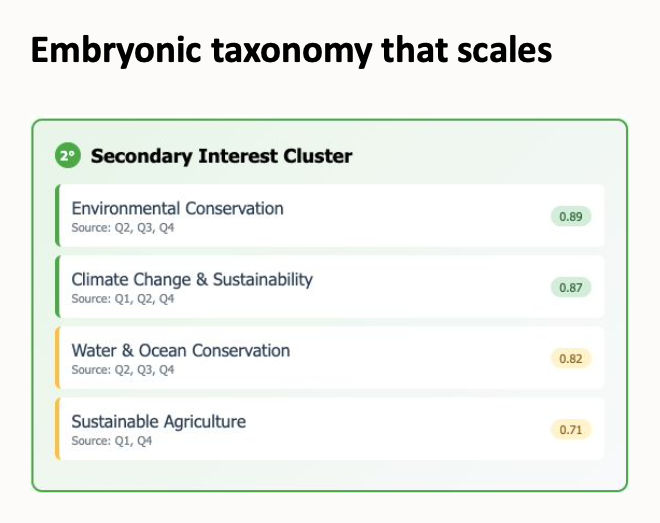The 20-50 lakh risk for families who spend on students’ college without data
- career choices
- October 14, 2025
Education fees investment risk
Think of a family who makes a property buying decision—there is an exhaustive research. They see the map or visit the sites multiple times, consult brokers and experts, analyze market trends for the ROI, and explore the facilities if they plan to live there. Now compare it to how they make educational investments on their kids’ college rather than seeking the right career counselling from the right people.
The risk of selecting wrong college for the students
The percentage of students who want to change their career within the first year in the college is all-time high. From those who complete their degree, many students actually change the path as soon as they are out of college. Families do not fully realize how it affects their internal harmony because of the conflict and uncertainty about the college degree’s usefulness to the student.
Family bonding and dynamics, confidence
- They experience the financial stress if they decide to invest in another degree or certification after the student opts of the first choice college
- It hurts the student’s self-confidence and they might not be sure of their next college decisions as well
- It delays the life’s other important milestones such as their marriage (if they want to) and career stability
- Students often feel lagging-behind their peers who select the right college and career because many of them start working earlier
Career trajectory
- Sometimes, it becomes complicated to explain the change in job interviews (though there is another school of thought that the job interviews should not raise this question but not every student can prepare themselves for such questions)
- The career starting late shows its compounding effect later on, for the career stability trajectory
Why intelligent families make poor career decisions
Wrong references to trust
- Parents are influenced by factors that might not be important for the student’s strengths and aspirations
- Students lack the right experience and they do not get the right guidance to discuss the long-term implications of wrong career choices
- The coaching institutes are not equipped to answer students’ questions about career path because this is their primary expertise
- Parents see many success stories in their contacts but they do not want to see thousands who struggle
- The family tends to map their career choices with their family and social status—it often backfires for the student’s capabilities and dreams
No structured decision-making option
- They do not have access to a structured process for educational investment analysis
- They do not have any decisions framework to compare the options see the trade-offs, or to test their assumptions
- “You can always switch later” underestimates the switching costs
- Parents’ anxiety or their own insecurity shows in how they prefer certain careers for their kids

What the families should find and measure
Know the career trajectory via data and stories
- How the career satisfaction rates have been changing in the last 5 years and how it might change in the next 5-10 years
- Example: Biotechnology has exciting entry options but the career progression is not as exciting because of the limited progression
- How the student’s early-career or mid-career life day look like
Understand the kid's patterns
- In which situations the kid’s friends trust them the most, for what kind of advice or support
- What kind of day to day life situations bothers the kid, and what makes them happy
- Example: Vaayu scored high in analytical skills and she would often volunteer every weekend to teach kids. Here, the analysis of motivation (and not her ability) shows coaching, mentoring, or education technology as a possible path because the family’s mind is locked in the financial analysis career option
Know about the market
- Are there some skills that have supply-demand imbalance?
- The patterns in the emerging vs declining sectors, and the career and salary trends
- Government support for projects in specific industries and sectors
Family's own and specific situation
- Does their own financial position have scope for the student’s career with a long gestation period
- If the parents seek support in the old age, does the career support their wishes
- Can the family absorb the pressure if the primary career choice does not work
Students' career selection: a framework for data-driven decisions for the families
Before the decision: Prepare
- Structured mapping of kids’ interest, motivation, curiosity points, life-dreams, and what gives them joy
- How their ideal day or week or month look like when they will be 30 or 40, watch their language and sense their goals
- Connect the dots in their thinking, do the same exercise for your life after 10 or 15 years and find the convergence of the expectations.
This could be a 20 to 50 Lakh worth an investment decision. Give due attention to the process.
- If you have the sources and time, make the student volunteer for a project in the shortlisted career path.
- Make them shadow someone in the same or similar career, and write the experiences or record the learnings; see if they are enjoying it
- Regular check-in to observe how the student’s interest is evolving and how it influences the family’s preferences for the career options

Sounds challenging and complicated?
How Steering works for you—systematically, holistically
Designed for family and students’ personal preferences and context
- We are not designed around a 30-minute personality or aptitude test; our assessment really make you think deep about your life aspirations, dreams, and wishes.
- Our intelligent theme extraction is domain-specific, and is self-learning. It identifies the patterns, and relationships that is often missing in psychometric tests; we build meaning in each word that the student says.
- Example: Student mentions “helping people feel confident,” “creating beautiful spaces,” and “brand.” Our system connects these multiple career paths intelligently, for example hospitality design—and it is possible that neither student nor parents had thought of it.
- Another example: Father is worried luxury brand management career scope, and the mother recognized communication strengths of their kid. Steering’s deep analysis proposes Brand Communications and adjacent possibilities, with measurable family alignment of 85%.
Builds your capacity to compare and see the trade-offs
- In Steering analysis, different career paths show their respective salary range, career trajectory notes, career growth trends in the future
- You see LinkedIn profiles of professionals in the same or similar fields—it helps you connect with the real people for inspiration
- A few university programs with alumni outcomes
- We do not recommend college or degree programs—we give you enough support, data, evidence, and context that you feel confident to make your own decision—this is your win
Framework and numbers to support your decisions
- Confidence scores based on self-awareness clarity, uncertainty, gap and conflict analysis, when mapped with the market and opportunities
- Relationship mapping for what the family says, finding convergence of ideas if you have conflicting preferences and opinions
- Identifying the red flags, for example “limited experience” or “external pressure factor”
References
- Students career and college selection: Their own internal conflicts, confusion, and uncertainties (link)
- Start with aspirations and not aptitude—reverse engineering how students select their career after their school (link)
- The hidden ROI of college degree fees and the investment on education, for Indian parents and families (link)
- A short guide: Steering for families (PDF)
- A real example of conversation between Steering and a family (link)
Your investment in the kid's career and education as big as your investment in buying a new house, in a business, or in a relationship
We offer a 15-minutes complimentary consultation to discuss your family’s and the student’s thoughts and your questions. This is not a quick career counselling exercise for the student, this is much deeper. Write to us at [email protected] or share details in this short form.